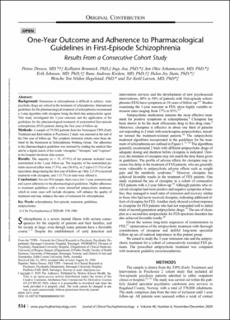| dc.contributor.author | Drosos, Petros | |
| dc.contributor.author | Brønnick, Kolbjørn Kallesten | |
| dc.contributor.author | Joa, Inge | |
| dc.contributor.author | Johannessen, Jan Olav | |
| dc.contributor.author | Johnsen, Erik | |
| dc.contributor.author | Kroken, Rune Andreas | |
| dc.contributor.author | Stain, Helen J. | |
| dc.contributor.author | Hegelstad, Wenche | |
| dc.contributor.author | Larsen, Tor Ketil | |
| dc.date.accessioned | 2021-04-29T13:13:57Z | |
| dc.date.available | 2021-04-29T13:13:57Z | |
| dc.date.created | 2020-11-17T14:49:10Z | |
| dc.date.issued | 2020 | |
| dc.Published | Journal of Clinical Psychopharmacology. 2020, 40 (6), 534-540. | |
| dc.identifier.issn | 0271-0749 | |
| dc.identifier.uri | https://hdl.handle.net/11250/2740421 | |
| dc.description.abstract | Background
Remission in schizophrenia is difficult to achieve. Antipsychotic drugs are critical in the treatment of schizophrenia. International guidelines for the pharmacological treatment of schizophrenia recommend a 3-step algorithm with clozapine being the third-line antipsychotic agent. This study investigated the 1-year outcome and the application of the guidelines for the pharmacological treatment of nonremitted first-episode schizophrenia (FES) patients during the first year of follow-up.
Methods
A sample of 78 FES patients from the Norwegian TIPS (Early Treatment and Intervention in Psychosis) 2 study was assessed at the end of the first year of follow-up. The symptom remission criteria were those defined by the Remission in Schizophrenia Working Group. The adherence to the pharmacological guidelines was assessed by reading the medical files and by a digital search of the words “clozapine,” “klozapin,” and “Leponex” in the hospital electronic data system.
Results
The majority (n = 53, 67.9%) of the patients included were nonremitted at the 1-year follow-up. The majority of the nonremitted patients received either none (7.5%), one (56.6%), or 2 types (15.1%) of antipsychotic drugs during the first year of follow-up. Only 2 (3.8%) received treatment with clozapine, and 3 (5.7%) in total were offered it.
Conclusions
For our FES sample, there was a low 1-year remission rate and a poor adherence to the pharmacological guidelines. Higher adherence to treatment guidelines with a more intensified antipsychotic treatment, which in some cases will include clozapine, will enhance the quality of treatment and may enhance the rates of remission for schizophrenia. | en_US |
| dc.language.iso | eng | en_US |
| dc.publisher | Wolters Kluwer Health | en_US |
| dc.rights | Navngivelse 4.0 Internasjonal | * |
| dc.rights.uri | http://creativecommons.org/licenses/by/4.0/deed.no | * |
| dc.title | One-year outcome and adherence to pharmacological guidelines in first-episode schizophrenia: Results from a consecutive cohort study | en_US |
| dc.type | Journal article | en_US |
| dc.type | Peer reviewed | en_US |
| dc.description.version | publishedVersion | en_US |
| dc.rights.holder | Copyright 2020 The Author(s) | en_US |
| cristin.ispublished | true | |
| cristin.fulltext | original | |
| cristin.qualitycode | 1 | |
| dc.identifier.doi | 10.1097/JCP.0000000000001303 | |
| dc.identifier.cristin | 1848856 | |
| dc.source.journal | Journal of Clinical Psychopharmacology | en_US |
| dc.source.40 | 40 | |
| dc.source.14 | 6 | |
| dc.source.pagenumber | 534-540 | en_US |
| dc.identifier.citation | Journal of Clinical Psychopharmacology. 2020, 40 (6), 534-540 | en_US |
| dc.source.volume | 40 | en_US |
| dc.source.issue | 6 | en_US |

